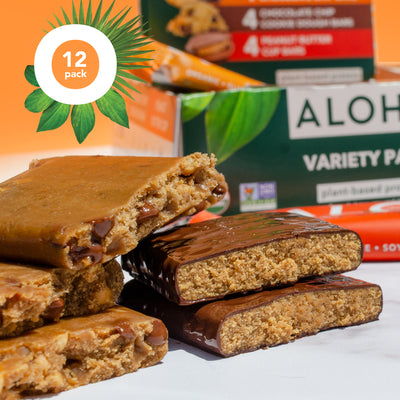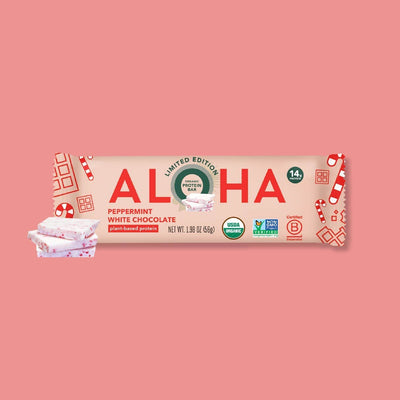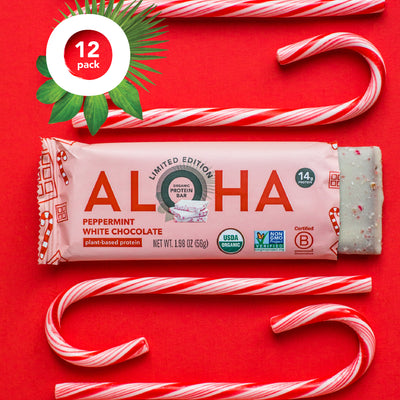Key Takeaways:
- Nutritional Differences Made Simple: Understand how whey and plant-based protein differ in digestion, sustainability, and ingredients.
- Why Plant-Based Is Gaining Ground: Discover why plant-based protein—like ALOHA’s soy-free powders—is growing in popularity across all lifestyles.
- Your Choice, Your Impact: Learn how your protein choice impacts not just your health, but also the environment and ethical sourcing.
At ALOHA, we do more than make great-tasting protein—we lead with purpose. As an employee-owned, Certified B Corp, we’ve built our brand on clean, organic ingredients and a commitment to the communities and planet we serve. Our plant-based protein powders aren’t just soy-free and dairy-free—they’re made to make you feel good, inside and out.
Protein is a big part of daily wellness, but not all proteins are created equal. Two of the most common choices—whey and plant-based—offer very different experiences when it comes to ingredients, digestion, sustainability, and how they make you feel. With more people leaning into plant-based living (whether full-time or flexitarian), understanding these differences has never been more important.
In this piece, we’ll break down the key differences between whey and plant-based protein—so you can decide what works best for your body, your goals, and your values.
What Is Whey Protein?
Whey protein is one of the most commonly used protein supplements out there, especially among athletes and gym-goers. It’s made from the liquid part of milk that separates during cheese production. This liquid—called whey—is processed and dried into a protein powder that’s rich in amino acids.
Because whey is animal-based, it contains all nine essential amino acids and is often marketed as a “complete protein.” It’s fast-digesting, which makes it popular for post-workout recovery. However, since it comes from dairy, it may not be ideal for those who are lactose intolerant, allergic to milk, or following a plant-based lifestyle.
While whey is effective for building muscle, it doesn’t always sit well with everyone—especially when it comes to digestion or dietary preferences.
What Is Plant-Based Protein?
Plant-based protein is made from sources like peas, brown rice, hemp, pumpkin seeds, and other nutrient-rich plants. Unlike whey, it contains no dairy or animal byproducts, making it a great option for vegans, vegetarians, and anyone looking to eat more plant-forward.
While not every plant protein is a complete protein on its own, many blends—like the kind used in ALOHA’s protein powders—combine complementary sources to offer a full amino acid profile. That means you're still getting everything your body needs, without relying on animal-based products.
One of the best parts? Plant-based protein is easier on the stomach for many people. And because it’s naturally free from common allergens like soy and dairy, it’s often a gentler, more inclusive option for a wider range of dietary needs.
How They're Made
Understanding how your protein powder is produced can help you make better choices for your health and values. Here's a breakdown of how whey and plant-based proteins are made, highlighting the key differences in their origins and processing:
Whey Protein
Whey protein starts as a byproduct of cheese making. When milk is curdled and strained, it separates into curds (used for cheese) and liquid whey. This liquid is then filtered, pasteurized, and dried into powder. Additives like flavorings, sweeteners, or preservatives are often added depending on the brand. Since it’s dairy-based, it involves animal farming and processing.
Plant-Based Protein
Plant-based protein, on the other hand, begins with whole plant ingredients—like organic peas, brown rice, or pumpkin seeds. These are ground down, filtered, and gently processed to extract the protein, while keeping as many nutrients intact as possible. ALOHA, for example, takes care to use non-GMO ingredients and avoid artificial anything. Plus, our protein powders are soy-free and made without dairy, making them easier on your body and the planet.
In short, plant-based protein focuses on clean, simple ingredients. Whey, while effective, tends to be more processed and reliant on animal farming.
Nutrition Showdown: Whey Vs Plant-Based
Both whey and plant-based proteins can pack a powerful punch when it comes to nutrition—but how they get there is where the differences start to show.
Whey Protein
Whey is high in protein per serving and naturally contains all nine essential amino acids, making it a complete protein. It's also rich in branched-chain amino acids (BCAAs), which support muscle recovery. But it's not always clean: many whey powders include artificial sweeteners, fillers, and dairy-derived additives. And for those sensitive to lactose, it can cause bloating or discomfort.
Plant-Based Protein
Plant-based powders—like ALOHA’s—combine ingredients like organic peas, pumpkin seeds, and brown rice to create a full amino acid profile, without the need for dairy. They also come with added nutritional benefits like fiber, iron, and antioxidants that animal-based proteins typically lack. And with no soy, no GMOs, and no artificial ingredients, plant-based protein offers a clean, simple way to fuel your body.
While both can help meet your protein needs, plant-based options are often more versatile, cleaner, and easier to digest—especially if you’re looking for something that supports overall wellness and not just muscle gain.
How Your Body Handles Each
Not all proteins are digested the same way—and how your body responds can make a big difference in how you feel and perform. Here's how whey and plant-based proteins compare when it comes to digestion and overall impact on the body:
Whey Protein
Whey is known for being fast-digesting, which is why it’s often recommended for post-workout recovery. But for many people—especially those who are lactose intolerant or sensitive to dairy—it can cause digestive issues like bloating, gas, or discomfort. Some people also experience acne or inflammation when consuming dairy-based products regularly.
Plant-Based Protein
Plant-based protein tends to be gentler on digestion. It’s dairy-free, often gluten-free, and in ALOHA’s case, always soy-free. Many people find they feel lighter and more energized after switching to a plant-based option. Plus, plant protein often contains natural fiber, which helps support digestion and keeps things moving smoothly.
When it comes to how your body processes protein, feeling good matters just as much as building muscle. And for more and more people, plant-based protein just feels better.
Environmental Impact Of Each
What you eat doesn’t just affect your body—it also leaves a mark on the planet. Here's how whey and plant-based proteins stack up when it comes to sustainability and environmental responsibility:
Whey Protein
Since whey comes from milk, it relies on the dairy industry—which has a large environmental footprint. Raising cows requires significant land, water, and feed. It also contributes to greenhouse gas emissions, particularly methane. Even though whey is technically a byproduct of cheese production, it still supports a system that places a heavy load on the planet.
Plant-Based Protein
Plant-based protein has a much smaller environmental impact. Growing crops like peas or pumpkin seeds uses fewer resources and produces fewer emissions. Brands like ALOHA go a step further by sourcing responsibly and supporting organic, sustainable farming practices. Plus, ALOHA is a Certified B Corp and employee-owned—so doing good for the planet is part of the mission, not just a marketing angle.
When you choose plant-based, you’re not just nourishing your body—you’re making a choice that’s better for the earth, too.
Taste, Texture, And Versatility
Flavor and mixability can make or break your daily protein routine—so it’s worth knowing what to expect from each option. Here’s how whey and plant-based proteins compare when it comes to everyday enjoyment:
Whey Protein
Whey has been on the market for a long time, so it comes in a variety of flavors and forms. But let’s be honest—not all of them are great. Some whey powders have a chalky texture or artificial aftertaste, especially when they include synthetic sweeteners. It mixes well in shakes but can curdle in hot liquids and often contains additives to mask the dairy flavor.
Plant-Based Protein
Plant-based protein has come a long way in both flavor and texture. ALOHA’s Chocolate and Vanilla Protein Powders are smooth, rich, and satisfying—no grit, no fake taste. Because they’re made with real, plant-based ingredients and no artificial sweeteners, they work great in everything from smoothies to baked goods and even oatmeal. And with a clean, soy-free formula, they’re as easy on the taste buds as they are on the stomach.
Whether you’re blending, baking, or just mixing with water, plant-based protein offers a clean and delicious way to stay fueled.
Why More People Are Going Plant-Based
More and more people are making the shift to plant-based protein—and it’s not just a trend. It’s a choice that supports better health, a more sustainable lifestyle, and a sense of purpose behind what we consume.
For many, plant-based protein is easier on digestion, free from common allergens like dairy and soy, and made from recognizable, whole-food ingredients. It fits into more lifestyles—from vegan and vegetarian to flexitarian or simply mindful eaters. And unlike some whey products, plant-based options don’t require compromising on flavor, nutrition, or values.
Choosing plant-based is also about feeling good in every sense—physically, ethically, and environmentally. It’s a small shift that can make a meaningful impact.
Meet ALOHA: Plant-Based Protein With Purpose
At ALOHA, we believe that what you put into your body should support your well-being—and your values. That’s why all of our protein powders are plant-based, soy-free, and made with ingredients you can actually recognize.
Whether you choose our Chocolate Protein Powder or Vanilla Protein Powder, you’re getting a smooth, delicious blend crafted from organic peas, pumpkin seeds, and brown rice. No dairy. No artificial sweeteners. Just clean, sustainable fuel you can feel good about.
But we’re about more than just good ingredients. ALOHA is employee-owned and a Certified B Corp, which means we’re committed to doing business in a way that supports people and the planet. From sustainable sourcing to giving back to communities, we’re building a brand that makes wellness accessible—and purposeful.
Because better choices should feel better in every way.
Final Thoughts
When it comes to plant based protein vs whey, the best choice depends on what matters most to you. If you're focused strictly on muscle-building and aren't sensitive to dairy, whey might work for you. But if you're looking for a cleaner, more inclusive option that supports your body, your values, and the planet, plant-based protein makes a strong case.
With products like ALOHA’s organic, soy-free protein powders, you're not just meeting your nutritional goals—you’re choosing something that feels better, tastes better, and does better. Whether you're mixing up a post-workout smoothie or baking your favorite snacks, plant-based protein gives you the flexibility and peace of mind you deserve.
In the end, it’s about more than just protein. It’s about choosing wellness that aligns with who you are—and what you care about.
Read also:
- Benefits Of Superfoods: Why They Boost Your Health
- Superfood Recipes: Easy And Healthy Meal Ideas
- How Long Does Protein Stay In Your System? Key Facts
Frequently Asked Questions About Whey Vs Plant-Based Protein
Is one better for meal replacement—whey or plant-based protein?
Plant-based protein tends to work better as a meal replacement because it often includes fiber and other nutrients from whole food sources. This makes it more filling and balanced for longer-lasting energy.
Which protein type is more suitable for children or teens?
Plant-based protein is generally considered safer for a wider range of dietary needs, including children and teens, especially when it’s free from allergens like soy and dairy. However, it's best to consult a healthcare provider for growing kids.
Can I use both whey and plant-based protein in my routine?
Yes, some people alternate between the two based on preference, availability, or activity level. Just be mindful of how your body responds to each, especially if you're sensitive to dairy or additives.
Does plant-based protein spoil faster than whey protein?
Not necessarily. Both whey and plant-based protein powders have long shelf lives if stored properly. However, plant-based powders with fewer preservatives may have slightly shorter durations once opened.
Is one type of protein better for baking or cooking?
Plant-based protein generally holds up better in high-heat cooking and baking. Whey can sometimes curdle or alter the texture of baked goods.
Do plant-based proteins support muscle growth as well as whey?
Yes—especially when you choose a complete plant protein with all essential amino acids. When paired with proper training and nutrition, plant-based protein can support muscle growth just as effectively as whey.
How do these proteins affect blood sugar levels?
Whey may cause a quicker insulin response due to its rapid digestion. Plant-based protein tends to have a slower effect on blood sugar, especially when it includes fiber and is made from whole foods.
Are there any benefits to choosing protein powders with fewer ingredients?
Absolutely. Fewer ingredients often mean a cleaner label, fewer additives, and less risk of allergens or sensitivities. This is one reason many people opt for brands like ALOHA.
How can I tell if a protein powder is truly plant-based?
Check the ingredient list and look for certifications like “vegan,” “plant-based,” or “Certified B Corp.” Brands that are transparent about their sourcing and practices tend to be more trustworthy.
Does the source of the protein affect how full I feel?
Yes. Plant-based proteins often come with fiber and healthy fats that promote satiety, whereas whey digests more quickly, which might leave you feeling hungry sooner.












